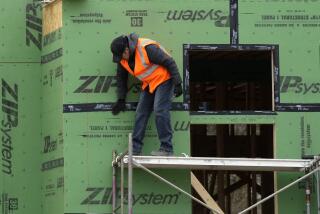Things Are Tough All Over : While the U.S. Jobless Rate Dips a Bit, the Improvement Is Not Evenly Spread Out
- Share via
The Labor Department reported Friday that the nation’s unemployment rate dipped slightly to 7.7% in July. Although the jobless data indicates a slight improvement in the sluggish economy, the recovery is uneven throughout the country.
To assess the strength of the job market in various regions, Times staff writers spoke with economists, government officials, company officials and the unemployed workers. Here’s what they found:
Southeast
When asked about the recession, you might excuse Southerners if they respond, “What recession?”
As much of the nation struggles with unusually high unemployment, retrenchment in manufacturing, lackluster retail sales and depressed real estate markets, this region of the country has generally fared much better.
“We are a little bit different than the rest of the nation,” says Sheila Tschinkel, an economist for the Federal Reserve Bank in Atlanta. “For one thing, our labor force has grown more, and we’ve also had more job growth. We think that is partly because we continue to see some in-migration.”
She adds that the region’s industrial sector is doing well in autos and textiles.
Still, there are some signs of stress. In June, Georgia’s unemployment rate rose to 6.9%, it’s highest point since 1986. The Georgia Department of Labor says only 9,500 new jobs were created in the state, while 30,073 job-seekers entered the labor force.
Timothy Mescon, dean of the Kennesaw State College School of Business Administration, just northwest of Atlanta, thinks many companies are not hiring because they are trying to increase productivity.
“If you can shrink your work force and still squeeze out the same output levels, or even slightly more, you are increasing productivity,” Mescon says. “Many, many organizations are still capitalizing on this wave of downsizing.”
The flip side of the downsizing is that Mescon has seen a growth in entrepreneurial activity. “I can’t tell you how many IBM’ers I’ve talked to in the past month who are coming to the market with pretty good settlement and early retirement packages, who are transforming that not into investment income but into businesses.”
Many Southern manufacturers have done better than their counterparts elsewhere. In Tennessee, with its newer automobile plants, the slowdown in the auto industry has hardly been felt. Employment continues to be strong.
Mississippi, however, is lagging behind in jobs with an unemployment rate of 9.4%. The state’s food processing, defense, shipbuilding and energy industries have all been hurt.
“Mississippi sort of got hit by everything,” Tschinkel says.
More to Read
Inside the business of entertainment
The Wide Shot brings you news, analysis and insights on everything from streaming wars to production — and what it all means for the future.
You may occasionally receive promotional content from the Los Angeles Times.










